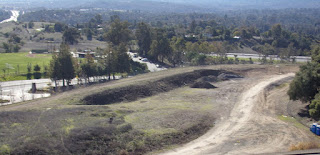Originally published 6/18/15
Sheep are currently being used to manage the weeds and grass that have sprung up under the solar farm at Cañada College. This approach is gaining popularity in the solar industry as an effective and environmentally friendly way to accomplish what is commonly known as “vegetative management.”
 |
| Two ewes take a lunch break under the shade of the solar installation atCañada College |
The Cañada College Solar Farm is situated on about 3.5 flat acres near the entrance of the campus. It is the first renewable energy project within San Mateo County Community College District. A project of this size and complexity presents a great degree of collaboration in design, construction and long term care. This project, in particular, took many variables into consideration; primary among them are the safety of students and staff, protection and security of the photovoltaic system, environmental stewardship, and renewable energy production value.
“Utilizing sheep for vegetative management of the solar farm is a truly sustainable solution… we are addressing the key components of ecology, equity and economy by leveraging this innovative technique” notes Joe Fullerton, Energy and Sustainability Manager for the District. As the sheep continue to work on reducing the weeds and grass undergrowth on the site, the solar field continues to offset more than half of the energy need of the campus.The approximately 200 South American breed of sheep used for the vegetative management of the solar farm help accomplish these goals in a variety of ways. The sheep are busy mowing down tall grass that poses a fire danger to our campus community as well as to the system. These same weeds and grasses threaten valuable production if they grow so tall as to shade the panels from the power of the sun. Sheep are also an environmentally sustainable option and are much preferred to using weed abatement techniques such as plastic tarps or herbicides, which could negatively impact the quantity and quality of storm water flows into local streams and waterways. Simply mowing the site comes with its own set of human and system safety risks as well as environmental impacts. These too are avoided by utilizing sheep for the operation.
 |
| Undergrowth before sheep |
 |
| Undergrowth after sheep |
“Utilizing sheep for vegetative management of the solar farm is a truly sustainable solution… we are addressing the key components of ecology, equity and economy by leveraging this innovative technique” notes Joe Fullerton, Energy and Sustainability Manager for the District.
As the sheep continue to work on reducing the undergrowth on the site until June 2015, the solar field continues to offset more than half of the energy need of the campus.




